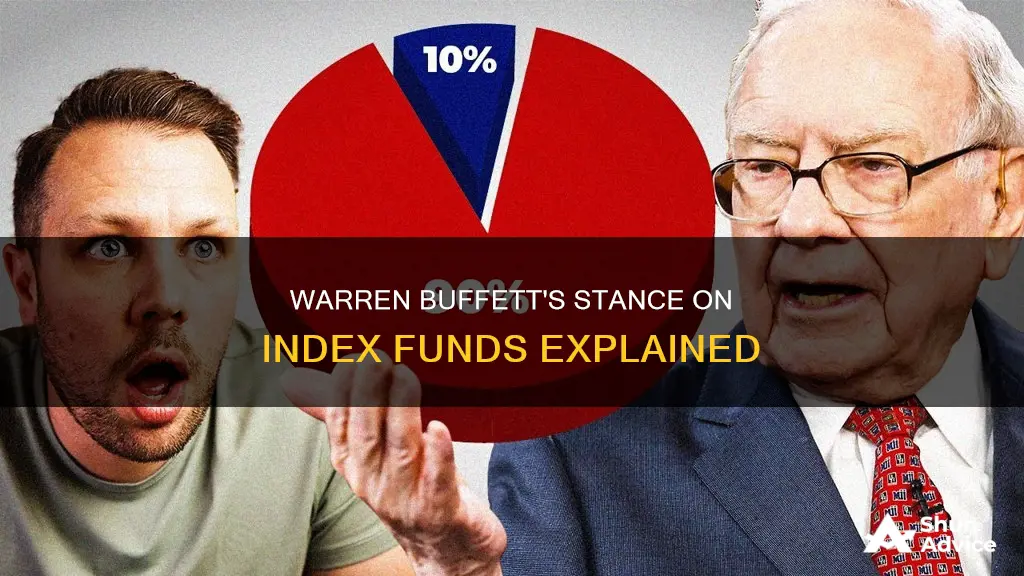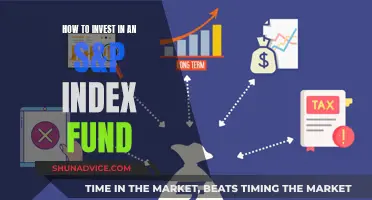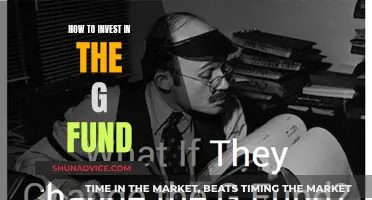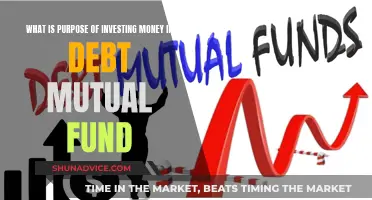
Despite being a vocal advocate for index funds, Warren Buffett, the billionaire CEO of Berkshire Hathaway, does not invest in them. This is surprising, given his belief that low-cost index funds can outperform hedge fund managers in the long term. In fact, Buffett has gone so far as to recommend that non-professional investors would be best served by investing in these funds, even stating that his heirs will inherit most of his wealth in the form of index funds. However, Berkshire Hathaway's portfolio reveals that only a minuscule portion of their investments are in index funds, with just two index funds making up around 0.01% of the company's total investments. So, why doesn't Buffett practise what he preaches?
| Characteristics | Values |
|---|---|
| Diversification | Index funds are designed to provide diversification, but the largest companies within the fund may skew the investment towards certain sectors. |
| Performance | Historical returns do not guarantee future performance, and individual stocks may offer faster growth or better dividends. |
| Cost | Index funds are typically cheaper to invest in than actively managed funds, but some individual stocks may be cheaper. |
| Control | Index funds are passive investments that track a market index, whereas individual stocks allow for more control and active investing. |
What You'll Learn

Buffett is not a passive investor
Warren Buffett is not a passive investor. As a hedge fund manager, he acquired Berkshire as a failing textile manufacturer and turned it into one of the biggest and most successful holding companies in the world.
Buffett is a huge fan of index funds and has consistently recommended that non-professional investors would be best served by investing in low-cost index funds. In fact, it has been reported that his heirs will inherit most of the money he leaves them in the form of index funds. Buffett has also instructed that, upon his death, the trustee of his wife's inheritance should put 90% of the money into a low-fee stock index and the remainder into short-term government bonds.
Despite his vocal support for index funds, Buffett's holding company, Berkshire Hathaway, has only invested a minuscule amount in them. Berkshire Hathaway's portfolio shows investments in just two index funds—the SPDR S&P 500 ETF and the Vanguard 500 Index Fund ETF—making up around 0.01% of the company's investments combined.
Buffett's decision to primarily invest in individual stocks rather than index funds may be due to his expertise and success as an active investor. As a legendary investor with a net worth of $75 billion, Buffett has the skills and resources to identify market-beating investments and actively manage his portfolio.
In summary, while Buffett recommends index funds for most investors, his own investment strategy involves actively investing in individual stocks. This approach has allowed him to build an incredibly successful business empire and accumulate a substantial personal fortune.
Best Vanguard Index Funds to Invest $1000 Minimum
You may want to see also

Index funds are not suitable for expert investors
Warren Buffett is a vocal advocate for index funds, and while he has invested in them, it is only a minuscule portion of his overall portfolio. There are a few reasons why an expert investor like Buffett may not find index funds suitable.
Firstly, index funds are designed to provide diversification, but the stocks within the fund are weighted according to the market capitalisation of each company. This means that an investor's money will be skewed towards the largest firms, resulting in greater exposure to certain sectors than intended. For example, technology firms comprise a significant portion of the S&P 500's market value, so any weakness in the tech sector could disproportionately impact the performance of an index fund tracking the S&P 500. Expert investors may prefer to have more control over their sector allocations and may seek a more balanced approach by investing in individual stocks in niche industries or foreign stocks.
Secondly, while index funds have delivered strong historical performance, past performance does not guarantee future returns. The S&P 500's average annual growth rate of 10.15% from 1957 through 2022 may not be indicative of future growth rates. Expert investors seeking accelerated growth or better dividends may find more attractive opportunities in individual stocks, such as defence contractor TransDigm Group, which reported significant revenue and operational income growth.
Thirdly, index funds like the S&P 500 trade at a specific price-to-earnings (P/E) ratio, which may not be as attractive as the P/E ratios of certain individual stocks or sectors. For instance, Verizon has a lower P/E ratio than the S&P 500 and also offers a substantial dividend yield. Expert investors looking for cheaper investment opportunities or willing to take calculated risks on undervalued stocks may prefer to invest directly in individual companies rather than through an index fund.
Finally, index funds are a form of passive investing, which may not align with the goals and strategies of expert investors. Passive investing aims to emulate the market's performance rather than outperform it. Expert investors like Buffett, with extensive knowledge and experience in the stock market, may prefer an active investing approach, allowing them to leverage their expertise to make specific stock picks and attempt to beat the market.
Explore Mutual Funds for Your Defence Sector Investment
You may want to see also

Index funds are not a good option for those seeking accelerated growth
While Warren Buffett recommends index funds for investors, he hardly invests in any himself. Here are a few reasons why index funds may not be a good option for those seeking accelerated growth:
Lack of diversification
One of the primary reasons people invest in an index fund is diversification. However, because the stocks within the fund are weighted based on the market cap of each company, your investment will be skewed towards the largest firms, resulting in overexposure to certain sectors without you even realizing it. For example, technology firms account for a significant 26% of the S&P 500's market value, and any weakness in this sector could have a disproportionately large impact on the performance of the index fund.
Past performance doesn't guarantee future results
Index funds, such as the S&P 500, have delivered strong performance in the past, with an average annual growth rate of 10.15% from 1957 through December 31, 2022. However, it's important to remember that past performance does not guarantee future results. The high historical returns do not necessarily mean that investors can expect the same rate of growth in the future.
Individual stocks may offer faster growth
If you're seeking accelerated growth, individual stocks may be a better option than index funds. While index funds provide stable, long-term growth, some individual stocks are currently growing at much faster rates. For example, defense contractor TransDigm Group reported 20% revenue growth and 53% operational income growth year-over-year in the second fiscal quarter, with the stock up around 38% year-to-date.
Some individual stocks are cheaper
The S&P 500 is currently trading at a price-to-earnings (P/E) ratio of around 25, which is reasonable given its historical performance. However, there are individual stocks and specific sectors that are cheaper than the market average. For instance, Verizon has a P/E of around 6.4 and offers a dividend yield of 7.8%. Therefore, if you're looking for something cheap or are willing to take a chance on an under-the-radar opportunity, index funds may not be the best choice.
Mutual Funds and Treps: A Smart Investment Strategy
You may want to see also

Index funds are not a good option for those seeking better dividends
Warren Buffett is a vocal advocate for index funds, particularly for non-professional investors. However, it is interesting to note that his holding company, Berkshire Hathaway, only invests a minuscule amount in these funds. This begs the question: why doesn't Buffett invest more significantly in index funds himself?
One reason could be the desire for better dividends. While index funds offer stable and diversified investment options, they may not be the best choice for those seeking higher dividend yields. Index funds are designed to emulate the market, and as such, their performance tends to mirror the overall market returns. This means that while index funds can provide steady growth over time, they might not offer the same potential for accelerated growth or higher dividends as individual stocks.
For example, consider the performance of the S&P 500, a commonly tracked index by index funds. From 1957 through December 31, 2022, the S&P 500 delivered an average annual growth rate of 10.15%. While this has been excellent for long-term investors, individual stocks like Defense contractor TransDigm Group have reported higher growth rates. In the second fiscal quarter, TransDigm Group achieved a remarkable 20% revenue growth and a 53% operational income growth year over year, with the stock up around 38% year to date.
Additionally, some individual stocks offer more attractive dividend yields than what one might find in an index fund. For instance, Verizon has a dividend yield of 7.8%, which is significantly higher than the average yield of the S&P 500.
Therefore, if an investor is specifically seeking better dividends and accelerated growth, they may be more inclined to explore individual stocks rather than index funds. This could be a factor in Buffett's investment strategy, as he is known for his savvy stock-picking skills and his ability to identify companies with strong growth potential.
In conclusion, while index funds offer a simple and effective investment strategy for many, they may not be the optimal choice for those seeking higher dividend yields or accelerated growth. As such, it is not surprising that Buffett, with his expertise and resources, might opt for other investment opportunities that better align with his specific financial goals and risk tolerance.
Oil Fund Investment: A Smart Financial Move?
You may want to see also

Index funds are not a good option for those seeking cheap investment options
Warren Buffett is a vocal advocate for index funds, particularly for non-professional investors. He has consistently recommended low-cost index funds, even going so far as to bet $1 million on an index fund outperforming a basket of hedge funds, which he won. However, it is interesting to note that Buffett himself, through his holding company Berkshire Hathaway, has only invested a minuscule amount in index funds. This begs the question: are index funds a good option for those seeking cheap investment opportunities? The answer is nuanced.
Firstly, it is important to understand the nature of index funds. Index funds are a form of passive investing, where investors buy and hold a diversified portfolio of stocks to emulate the market rather than trying to beat it. Index funds are typically mutual funds or exchange-traded funds (ETFs) that track a specific market index, such as the S&P 500, and offer low fees and taxes. Buffett's recommendation for non-professional investors to invest in index funds stems from his belief that it is challenging to consistently identify market-beating talent, and that low fees are essential for maximising investment returns.
However, there are a few reasons why index funds may not be the best option for those seeking cheap investments. One of the primary appeals of index funds is diversification. For example, a fund tracking the S&P 500 aims to provide exposure to 500 different companies. But because the stocks within the fund are weighted by market capitalisation, your investment may be disproportionately skewed towards larger firms and certain sectors. For instance, technology firms account for a significant portion of the S&P 500's market value, so any weakness in this sector could disproportionately impact the fund's performance. Investors seeking a more balanced approach might prefer to select individual stocks from niche industries or foreign markets.
Additionally, while index funds have delivered strong historical performance, past returns do not guarantee future growth. Some individual stocks are currently growing at faster rates and offering higher dividends than index funds. For instance, defence contractor TransDigm Group reported 20% revenue growth and 53% operational income growth year-over-year, with its stock up around 38% year-to-date. If you are seeking accelerated growth or higher dividends, individual stocks may be a more attractive option.
Furthermore, while the S&P 500 trades at a reasonable price-to-earnings (P/E) ratio of around 25, there are individual stocks and sectors that offer cheaper valuations. For example, Verizon has a P/E of 6.4 and provides a dividend yield of 7.8%. Thus, if you are specifically seeking cheap investments, individual stocks may provide more affordable opportunities than index funds.
In conclusion, while Warren Buffett champions index funds for non-professional investors, they may not be the optimal choice for those prioritising cheap investment options. Index funds offer diversification and historical performance but come with the risk of sector bias and potentially lower growth and dividends compared to individual stocks. For those seeking inexpensive investments, individual stocks may provide more attractive valuations and the ability to target specific industries or foreign markets. Nonetheless, it is essential to remember that investing carries inherent risks, and one should carefully consider their investment goals, risk tolerance, and conduct thorough research before making any decisions.
Emergency Fund Strategies: UK Investment Options for Peace of Mind
You may want to see also
Frequently asked questions
Warren Buffett is a very successful investor and the CEO of Berkshire Hathaway. He is not a passive investor, and his company's portfolio shows that they have only invested in a tiny proportion of index funds.
Index funds are a form of passive investing. They are mutual funds or exchange-traded funds (ETFs) that track a major index, such as the S&P 500, and hold a representative sample of stocks or bonds from that index.
Yes, Warren Buffett recommends that non-professional investors put their money into low-cost index funds. He has called it "the thing that makes the most sense practically all of the time".
Although Buffett recommends index funds, he does not invest in them to a significant degree. He has said that he plans to leave most of his money to his heirs in the form of index funds. However, Berkshire Hathaway's portfolio only includes a minuscule amount of index funds.







